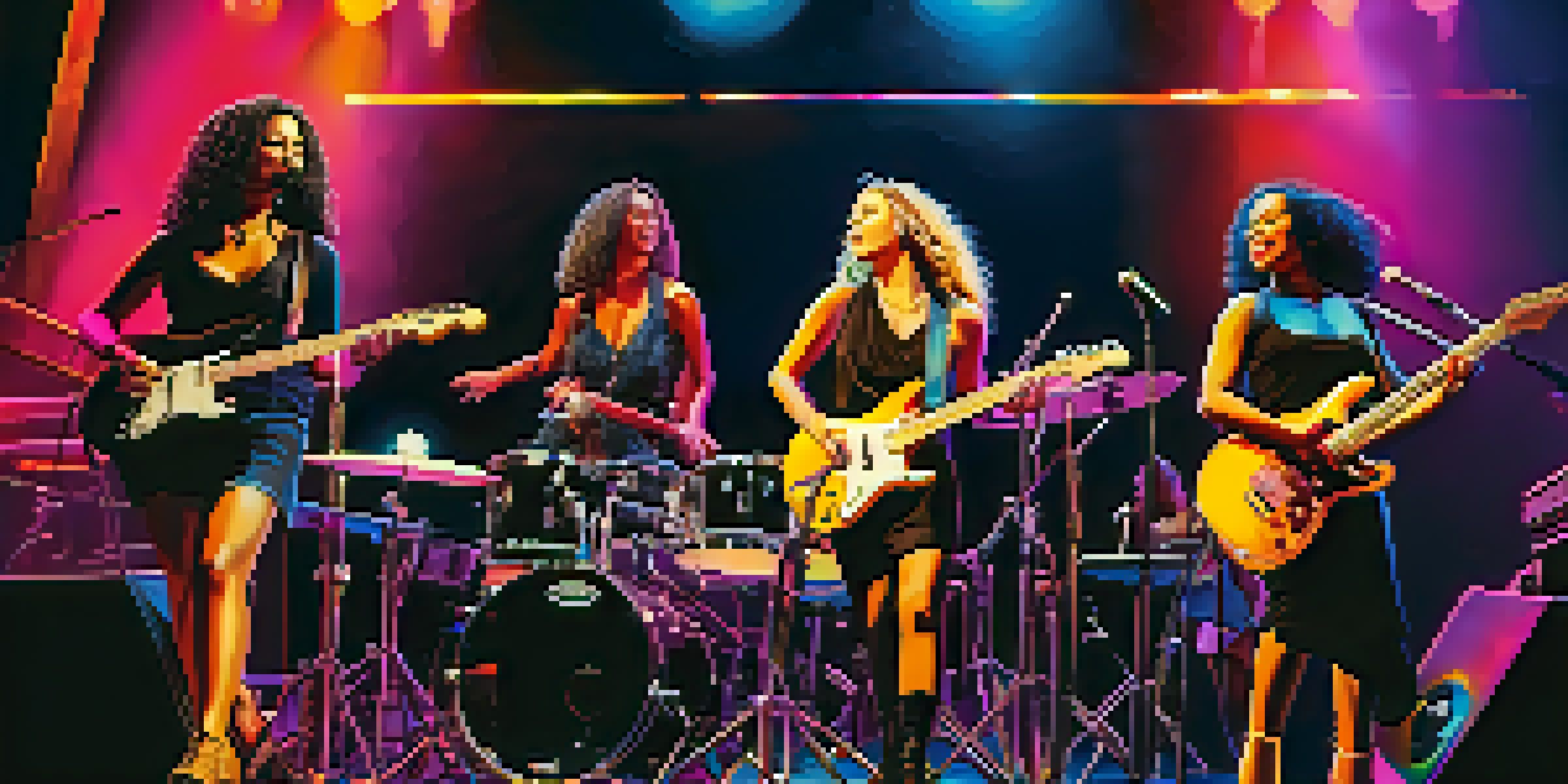The Feminist Movement's Impact on Music and Lyrics

The Roots of Feminism in Music: A Historical Overview
The feminist movement's roots in music date back to the suffragette era of the early 20th century. During this time, women began to use song as a powerful tool for activism, often singing about rights and social change. This historical backdrop laid the groundwork for the incorporation of feminist themes in various music genres, reflecting the struggles women faced.
The power of music is that it can speak to the human experience in ways that words alone cannot.
Fast forward to the 1960s and 1970s, and you see a surge in female artists using their voices as instruments of change. Iconic figures like Joan Baez and Aretha Franklin infused their music with messages of empowerment and equality. Their lyrics not only resonated with listeners but also sparked conversations about women's rights in a male-dominated industry.
As feminism evolved, so did the music it inspired. The emergence of punk rock and the Riot Grrrl movement in the 1990s brought a raw, unapologetic energy to the genre. Artists like Bikini Kill and Sleater-Kinney challenged societal norms, proving that music could be both a form of expression and a vehicle for activism.
Breaking Barriers: Female Artists in the Spotlight
The feminist movement has paved the way for countless female artists to take center stage, shattering glass ceilings in the music industry. This shift has led to a more diverse representation of women across genres, with artists like Beyoncé and Taylor Swift using their platforms to advocate for gender equality. Their lyrics often reflect personal experiences intertwined with broader societal issues, making their music relatable to many.

Moreover, the rise of social media has given female musicians a direct line to their audiences, allowing them to share their messages without the filter of traditional media. This democratization of music has led to more women speaking out on issues such as sexual harassment, body positivity, and mental health through their lyrics. Artists like Lizzo and Halsey have become champions of these causes, using their music to inspire change.
Feminism's Historic Influence in Music
The feminist movement has shaped music from the suffragette era to modern times, empowering female artists to address social issues through their lyrics.
As a result, the music industry is witnessing a shift in narrative, where female artists are not just seen but also heard. This visibility has encouraged a new generation of musicians to embrace their identities and use their art to challenge societal norms, furthering the impact of the feminist movement on music.
Lyricism: The Language of Empowerment
Lyrics have always been a powerful form of expression, and the feminist movement has influenced the language of empowerment in music. Female artists have increasingly used their songwriting to address issues such as inequality, sexual autonomy, and self-acceptance. This lyrical evolution reflects the changing attitudes towards women's rights and the importance of women's voices in society.
Feminism is for everybody. And music is a universal language that can amplify that message.
For instance, songs like Alanis Morissette's 'You Oughta Know' and Taylor Swift's 'The Man' confront personal and societal injustices head-on. These tracks not only resonate with listeners but also challenge the status quo, encouraging conversations around gender dynamics. The candidness in their lyrics serves as a reminder that women can articulate their emotions and experiences with strength.
Additionally, the rise of empowerment anthems in pop and hip-hop has inspired listeners to embrace their identities and fight for their rights. Tracks like 'Run the World (Girls)' by Beyoncé and 'Good as Hell' by Lizzo uplift women and foster a sense of solidarity, demonstrating how music can serve as a catalyst for change.
Intersectionality: Expanding the Feminist Dialogue in Music
The concept of intersectionality, introduced by scholar Kimberlé Crenshaw, has become increasingly relevant in the music industry. This approach recognizes that women experience oppression differently based on race, class, sexual orientation, and other identities. As a result, contemporary artists are weaving intersectional narratives into their music, highlighting the diverse experiences of women.
For instance, artists like Janelle Monáe and MUNA explore themes of race, sexuality, and gender fluidity in their lyrics. By doing so, they expand the feminist dialogue beyond traditional narratives, creating a more inclusive space for all voices. Their music not only entertains but also educates listeners about the complexities of identity and the importance of solidarity among marginalized groups.
Intersectionality in Contemporary Music
Current artists are incorporating intersectional narratives that highlight diverse experiences of women, expanding the feminist dialogue in the music industry.
This intersectional approach is crucial for fostering a deeper understanding of feminism in the music industry. It encourages artists and listeners alike to recognize that the fight for women's rights encompasses a wide range of issues, ultimately leading to a more equitable society.
The Role of Male Allies in Feminist Music
While the feminist movement has empowered female artists, male allies have also played a vital role in supporting women's voices in music. Many male musicians have used their platforms to advocate for gender equality, often collaborating with female artists to amplify their messages. This partnership can be seen in songs like 'Shallow' by Lady Gaga and Bradley Cooper, where both artists share the spotlight equally.
Moreover, male musicians such as John Legend and Ed Sheeran have openly addressed issues of sexism and harassment in the industry. By using their influence to speak out against these problems, they help create an environment where female artists feel more supported and empowered to share their stories. This allyship is essential for fostering change within an industry that has long favored male narratives.
As the conversation around feminism in music continues to evolve, the presence of male allies serves as a reminder that the fight for equality is a collective effort. Together, artists of all genders can create a more inclusive and equitable music landscape.
The Future of Feminism in Music: Emerging Voices
Looking ahead, the future of feminism in music appears promising, with a new generation of artists ready to challenge societal norms. Emerging voices, such as Billie Eilish and Olivia Rodrigo, are not only making waves in the industry but are also addressing issues like mental health and body image in their lyrics. Their candid approach resonates with younger audiences, making important conversations more accessible.
Additionally, the rise of platforms like TikTok has democratized music creation, allowing diverse voices to emerge. This shift has opened doors for artists from various backgrounds to share their stories and perspectives, further enriching the feminist dialogue in music. As more artists embrace their identities and experiences, the narrative surrounding feminism will continue to grow and evolve.
Emerging Voices of Change
New artists like Billie Eilish and Olivia Rodrigo are tackling critical issues such as mental health and body image, promising a bright future for feminism in music.
Ultimately, the feminist movement's impact on music and lyrics will remain significant as long as artists continue to use their voices for change. By fostering a culture of inclusivity and empowerment, the music industry can create a lasting legacy that champions the rights and experiences of all women.
Conclusion: Celebrating the Feminist Legacy in Music
In conclusion, the feminist movement has left an indelible mark on music and lyrics, shaping the industry in profound ways. From the early suffragette songs to contemporary anthems of empowerment, the evolution of female voices reflects the ongoing struggle for equality. This legacy not only inspires artists today but also encourages future generations to continue advocating for change.
As we celebrate the achievements of female musicians, it's essential to recognize the importance of diverse voices within the feminist movement. By embracing intersectionality and fostering allyship, the music industry can create a more inclusive environment that uplifts everyone. The stories told through music can drive awareness and inspire action towards a more equitable society.

Ultimately, the power of music lies in its ability to connect people and spark conversations. By understanding the feminist movement's impact on music, we can appreciate the rich tapestry of voices that continue to shape our cultural landscape, reminding us that the fight for equality is far from over.